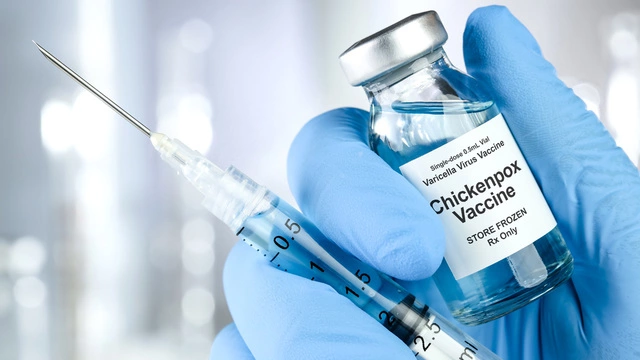Chickenpox is a disease that almost everyone considers safe if you experience it in childhood. At the same time, there are vaccinations against this infection, and in some countries vaccination against it is widespread. Let's figure out how much it is needed.
 15563
15563
How serious is the problem of chickenpox?
In temperate climates, more 100 out of 1,000 children under 9 years of age will have chickenpox within a year, and at least 90% of people will have it before adolescence. Other people remain susceptible to this infection into adulthood. In children, chickenpox is usually mild. You can learn more about it from our article.
Chickenpox (chickenpox)
Chickenpox is a childhood infection – most often “outbreaks” occur in kindergartens and lower grades of school. However, adults can also become infected with chickenpox, and with age, the likelihood of severe pathology and the risk of complications increases significantly.
Read the article
In developed countries, chickenpox leads to hospitalization of approximately five out of 1000 cases, and two to three out of 100 thousand patients die. Acute complications of the disease include bacterial sepsis, pneumonia, encephalitis, and cerebral hemorrhage. One of them develops in approximately two-thirds of hospitalized patients.
In Russia, from 500 to 1,150 thousand cases of chickenpox are recorded annually. Over the course of a decade, the incidence in the country has shown an upward trend, and the disease is aging – adults are becoming sick more often.
Most deaths – about 80% – occur in adult patients with chickenpox. In Russia they make up 5-6% of cases, teenagers 15-17 years old – 3-5%.
Groups at high risk of severe chickenpox include:
- people with compromised immunity (blood tumors, immunodeficiencies, taking drugs that weaken the immune system);
- newborns whose mothers had chickenpox five days before or two days after birth;
- premature babies;
- pregnant women without immunity to chickenpox.
Will we feel the effect of vaccination?
In some areas of the United States, chickenpox prevalence dropped by 80% from 1995 to 2003 (the early years of mass vaccination), roughly matching childhood vaccination coverage rates. The number of deaths from chickenpox has dropped by 88% after 12 years of a single-dose vaccination program. It is assumed that the effect after two vaccinations is more pronounced.
In a study in which most participants received just one chickenpox vaccine, protection against the infection was 90% over 15 years. The vaccine is still relatively new, so it is not known whether it provides lifelong protection.
The impact of chickenpox vaccination is significantly felt at the national level. For example, one calculation showed that even with a vaccine efficacy of 75% and vaccination coverage of 50%, the US population could gain almost 13,000 healthy life years annually.
We emphasize that varicella vaccines have demonstrated a good safety profile. They almost never, unlike chickenpox itself, cause dangerous complications.
Vaccination and herpes zoster
A possible long-term complication of chickenpox is herpes zoster or herpes zoster. Its risk increases with age: by age 85, half of people have it. Before the advent of vaccines, 30% of adults developed it at least once.
Shingles
Find out what happens when the chickenpox virus is reactivated in the body.
Read the articleThe chickenpox vaccine does not prevent the development of shingles. Moreover, for some time, the increase in its incidence has been associated with an increase in chickenpox vaccination coverage. The fact is that the chickenpox vaccine contains live, weakened viruses. However, now the American Centers for Disease Control and Prevention (CDC) considers this complication after vaccination to be a rare occurrence.
Vaccination: by whom and how is it recommended?
The World Health Organization (WHO) recommends routine vaccination against varicella in countries where the infection has a major public health impact. The WHO emphasizes that mass vaccinations should be undertaken only if it is possible to ensure vaccination coverage of more than 80%. Less coverage, experts fear, could lead to an increase in chickenpox incidence among adults. In this case, many will not get sick in childhood, but they will still have the possibility of contracting chickenpox as an adult. The British National Health System (NHS) also makes a similar reservation, explaining why vaccination is not recommended for everyone.
In Russia, vaccination against chickenpox is not included in the national vaccination calendar, that is, it is not mandatory. In the UK, it is only provided to those close to people at high risk of severe illness from the disease, and to healthcare workers who are not yet immune. In the United States, this vaccination is recommended for all children between 12 and 15 months of age. The second dose is given to children 4 to 6 years of age.
The CDC recommends that all adults and teens over 13 years of age who have not been previously immune receive the chickenpox vaccine. According to the organization, chickenpox vaccination is especially beneficial for:
- health care workers;
- those who care for people with weakened immune systems;
- teachers and kindergarten workers;
- students;
- employees and residents of nursing homes;
- military;
- women of childbearing age;
- adults and adolescents living with children.
- adults and adolescents living with children.
- li>
